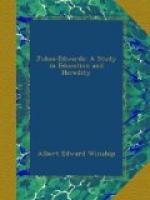It is very difficult to find anyone who is honest and industrious, pure and prosperous, who has not had a fair education, if he ever had the opportunity, as all children in the United States now have. It is an interesting fact developed from a study of the Jukes that it is much easier to reform a criminal than a pauper.
Here are a few facts by way of conclusion. On the basis of the facts gathered by Mr. Dugdale, 310 of the 1,200 were professional paupers, or more than one in four. These were in poorhouses or its equivalent for 2,300 years.
Three hundred of the 1,200, or one in four, died in infancy from lack of good care and good conditions.
There were fifty women who lived lives of notorious debauchery.
Four hundred men and women were physically wrecked early by their own wickedness.
There were seven murderers.
Sixty were habitual thieves who spent on the average twelve years each in lawless depredations.
There were 130 criminals who were convicted more or less often of crime.
What a picture this presents! Some slight improvement was apparent when Mr. Dugdale closed his studies. This resulted from evening schools, from manual training schools, from improved conditions of labor, from the later methods of treating prisoners.
CHAPTER II
A STUDY OF JONATHAN EDWARDS
The story of the Jukes as published by Mr. Dugdale has been the text of a multitude of sermons, the theme of numberless addresses, the inspiration of no end of editorials and essays. For twenty years there was a call for a companion picture. Every preacher, orator, and editor who presented the story of the Jukes, with its abhorrent features, wanted the facts for a cheery, comforting, convincing contrast. This was not to be had for the asking. Several attempts had been made to find the key to such a study without discovering a person of the required prominence, born sufficiently long ago, with the necessary vigor of intellect and strength of character who established the habit of having large families.
In 1897 a professional scholarly organization—to which the author has the honor to belong—assigned to him, without his knowledge or consent, the duty of preparing an essay upon Jonathan Edwards for the May meeting of 1898. The study then begun led to a search for the facts regarding his family, and when it came to light that one of Jonathan Edwards’ descendants presided over the New York Prison Commission when it employed Mr. Dugdale to make a study of the Jukes, the appropriateness of the contrast was more than ever apparent.




